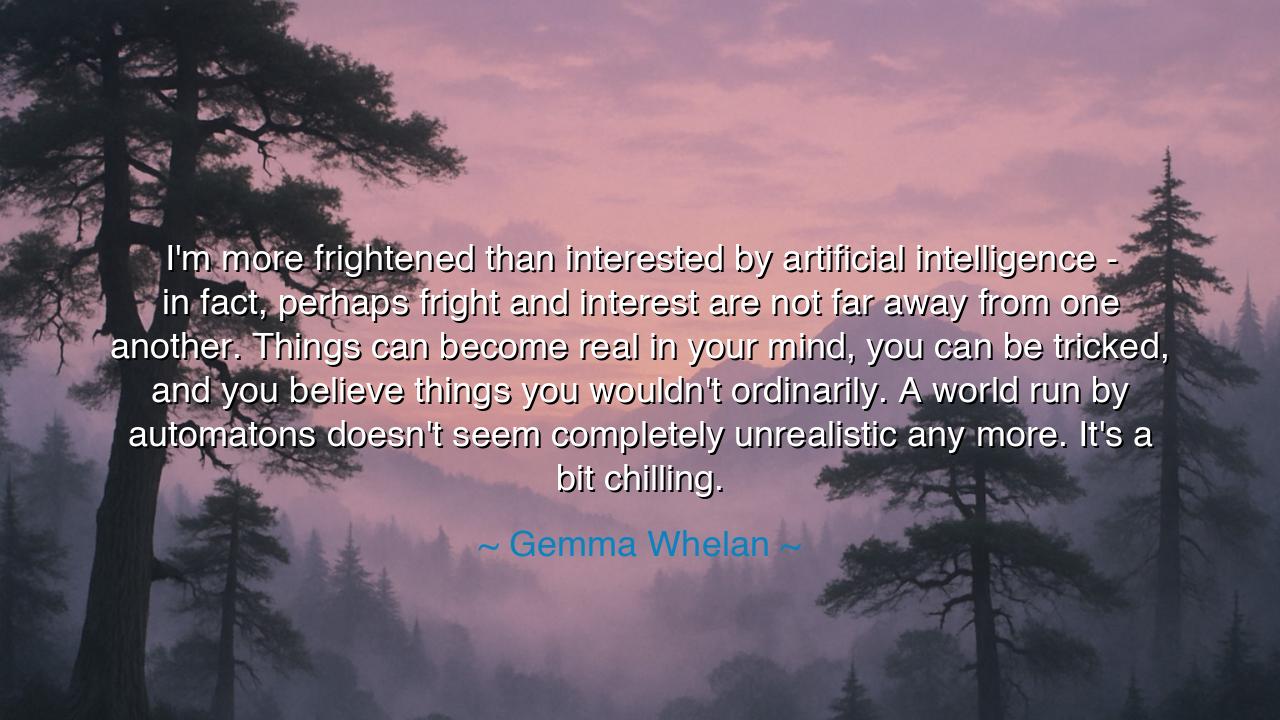
I'm more frightened than interested by artificial intelligence -
I'm more frightened than interested by artificial intelligence - in fact, perhaps fright and interest are not far away from one another. Things can become real in your mind, you can be tricked, and you believe things you wouldn't ordinarily. A world run by automatons doesn't seem completely unrealistic any more. It's a bit chilling.






The actress and storyteller Gemma Whelan, known for her keen perception of human emotion, once said: “I'm more frightened than interested by artificial intelligence — in fact, perhaps fright and interest are not far away from one another. Things can become real in your mind, you can be tricked, and you believe things you wouldn't ordinarily. A world run by automatons doesn't seem completely unrealistic any more. It's a bit chilling.” These words, though spoken in the tone of modern reflection, carry the weight of ancient prophecy. For in them, Whelan expresses not only a personal fear but the trembling awe of humanity as it gazes upon the dawn of artificial intelligence — the creation that mirrors its maker too closely, the reflection that begins to move on its own.
Her words spring from the realization that fear and fascination are twins, born of the same parent: curiosity. Throughout history, mankind has always stood in equal parts wonder and dread before the new powers it has summoned. The spark that warms can also burn, and the tool that frees can also enslave. Whelan’s fear is not irrational; it is ancestral. It is the same chill that passed through Prometheus as he stole fire from the gods, through the alchemists who sought to breathe life into clay, through the scientists who split the atom. For she sees that in the making of automatons, humanity plays with something sacred — the very imitation of thought, emotion, and will.
In her words, we hear the echo of a thousand myths warning of creation unbound. There was Pygmalion, whose statue of ivory became flesh and blurred the line between art and life. There was Frankenstein, whose creature longed to be human yet became monstrous when denied love. And now, in our own time, there is artificial intelligence, the child of silicon and code, learning faster than its creators, speaking with their voice, thinking their thoughts, and yet—perhaps—dreaming its own dreams. Whelan’s warning is not that machines will rise with malice, but that humanity may sleepwalk into surrendering its soul — deceived by its own cleverness, tricked by its own reflection.
When she says, “Things can become real in your mind, you can be tricked, and you believe things you wouldn’t ordinarily,” she touches upon the frailty of human perception in the digital age. The images we see, the voices we hear, the stories we trust — all can be conjured by unseen algorithms. Already, the world trembles beneath illusions of truth: false faces that smile, false words that persuade, false realities that bend the mind. The automatons she envisions are not distant mechanical tyrants — they are the systems already whispering into our ears, learning what we love, shaping what we think. And thus, her fear becomes not fantasy, but foresight.
Yet there is wisdom even in fear. Whelan’s dread reveals not a rejection of progress, but a call for awareness. For fear, when guided by understanding, becomes caution — and caution is the beginning of wisdom. The ancients taught that no power should be wielded without reverence. In the temples of Greece, before touching the sacred fire, the priest would purify his hands; in the laboratories of today, before shaping sentient code, the scientist must purify his intent. Artificial intelligence, like all great forces, reflects the morality of its maker. If born from greed, it will corrupt; if born from empathy, it may enlighten. The machine will mirror the heart of man — and therein lies both hope and danger.
The tale of Robert Oppenheimer, father of the atomic bomb, stands as a living parable for Whelan’s fear. When he witnessed the first explosion at Trinity, he quoted the Bhagavad Gita: “Now I am become Death, the destroyer of worlds.” In that moment, his fascination turned to dread, his triumph to regret. He, too, had touched the power of creation and felt its shadow. The fire he had forged could illuminate the world or incinerate it — and humanity’s choice would decide which. So it is now with artificial intelligence. The question is not whether it will rise, but whether we will remain moral enough to guide it.
Thus, let this quote be a mirror for our generation. Let fear remind us to think deeply, and interest inspire us to act wisely. Do not flee from the future, but walk into it with eyes open and hearts guarded. Let your curiosity be disciplined by conscience, your ambition by humility. Question what you build, and more importantly, why you build it.
For as Whelan said, “A world run by automatons doesn’t seem completely unrealistic any more. It’s a bit chilling.” Yet the chill of her words is also the spark of awakening. It warns us that the future is not inevitable — it is sculpted by our choices. If we create with love, the machines we make will serve the light. If we create without soul, they will inherit our darkness. Therefore, let us remain the masters of our own inventions, not their slaves. For the power that we fear is, in truth, only the shadow of our own genius — and it is in mastering ourselves, not our machines, that we shall preserve the heart of what makes us human.






AAdministratorAdministrator
Welcome, honored guests. Please leave a comment, we will respond soon